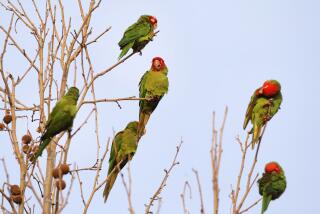Ferreting Out the Truth : Debate rages on whether California should make the natural predator (who is also soft and playful) a legal pet.
- Share via
They are either the silkiest, most playful and affectionate pets you could ever hope to have, or they’re beady-eyed little hellions just waiting for nature’s cue to ravage a chicken coop or gnaw a baby’s ear to shreds.
And soon, you may be able to have one of your very own.
Whatever the opinion, it’s certain that the common domesticated ferret is definitely capable of sowing confusion in the halls of government. Illegal in California since 1935, ferrets may soon be able to curl up on your couch with the full blessing of the law if the State Assembly passes a bill that would allow Californians to own ferrets as pets.
But not every lawmaker loves them.
The bill, which was recently passed by the Water, Parks and Wildlife Committee, ignited polarized debate in Sacramento. Were ferrets gentle and fun-loving, or were they a domesticated version of a centuries-old ferocious predator?
Think of “Kindergarten Cop” as a metaphor for the Great Ferret Debate. In the film, tough-guy cop turned kindergarten teacher Arnold Schwarzenegger charms the kids with his obligingly gentle and lovable pet ferret. The kids pet it. The ferret loves it. In the end, however, the ferret leaps at the bad guy and bites him in the neck, allowing Arnold to fill him full of lead.
So, how about it? Do you name your ferret Fluffy or Beelzebub?
Wildlife authorities are less than wild about ferrets. Yes, they say, ferrets are natural predators. And, left to their natural instincts in the wild, that’s what they’ll do.
“They were developed in Europe as a hunting animal,” said Bob Schlichting, a spokesman for the California Department of Fish and Game. “They’re kind of cuddly, and they have nice, mink-like fur, but they can be very vicious. Our main objection is that they’re not native to California, and we’d hate for a non-native population to establish itself (in the wild). They’re very efficient hunters and could wipe out poultry and rabbit farms and compete with other natural predators here.”
Ferrets, Schlichting said, were used for centuries to flush rabbits and rodents from burrows, but that wasn’t all they were capable of attacking.
“There have been lots of reports,” he said, “of ferrets getting into henhouses and killing everything in sight, almost like the feeding frenzy we associate with sharks. Ferrets will kill far beyond what they can eat. It’s just the sort of animal they are.”
Not so, said Bob Tetreault, the general manager of Orange County-based Russo’s Pets and a dedicated ferret fancier who raised ferrets in New Hampshire.
“They’re a wonderful pet,” he said, “a great pet. The reason they’re not legal is that legislators don’t have a clue as to what they’re talking about. People are under the impression that the ferret is a wild animal that people are trying to domesticate, but they’re not. The European ferret we’re talking about has been domestic as long as the domestic cat.
“People say they’re going to take over the countryside. That’s not the case. New Zealand tried to establish feral colonies of ferrets to control rodents, but the ferrets wouldn’t hunt. They even dropped food to them. But they died in the wild. They aren’t used to hunting. There are thousands of ferrets kept as pets in this state, and you don’t see them in the wild.”
Many thousands, in fact.
Assemblyman Jan Goldsmith (R-Poway), the sponsor of the ferret bill, estimated that between 100,000 and 500,000 ferrets are illegally owned in the state. (Ferrets are legal in all states except California, Hawaii, Massachusetts and Michigan.) Because the owners know they are keeping an illegal pet, they are reluctant to approach veterinarians about proper treatment for the animals. The bill is backed by the California Veterinary Medical Assn. for that reason, he said.
Where are all those ferrets coming from? Either from an extensive and established black market in animals (everything from parrots to exotic cats), or from neighboring states such as Nevada and Arizona, said Richard Evans, a veterinarian from Laguna Niguel. Evans, who has raised and sold ferrets outside of California and who is the medical director of the Laguna Niguel-based Pacific Wildlife Project, said ferrets make good pets but require special care.
“They’re playful little guys,” said Evans, who, during a tenure at Ralston Purina, developed one of the company’s more specific foods: Purina Ferret Chow. “There’s some issue about them biting, but their bite is no worse than that of a kitten. They’re good pets to the right person, but you have to take care to make your house ferret-proof. They like to get into all kinds of things. And you have to take care that they don’t get out.”
They’re not for everyone, said Kent Yamaguchi, curator of education for the Santa Ana Zoo.
“Ferrets are very intelligent and easy to train if you have one with the right temperament,” he said. “But if they’re harassed, or their psychological well-being isn’t taken care of--just like any smart animal--they can nip or bite. They’re real fun to play with, but they have their special needs.”
The zoo, said Yamaguchi, used to keep a ferret that was exhibited at schools as part of the Zoomobile program (permits for ferrets can legally be issued to exhibitors, trainers and other professionals). However the ferret is no longer a zoo resident.
“We felt we were giving a double message to the kids,” Yamaguchi said. “It would be ‘Isn’t this a great animal? You can’t have it.’ If ferrets were made legal, though, there would be the possibility that we would use one in our Zoomobile program.”
People continue to be curious about ferrets as pets. Forrest De Spain, the director of the Orange County Zoo at Irvine Regional Park, said that “a significant amount of people come through here and say they have a brother or a cousin who has a ferret. They’ll also say they saw a ferret in ‘Kindergarten Cop.’ ”
“You can never thoroughly domesticate them,” Schlichting said. “They’re cute and cuddly, but they can turn on you.”
In particular, he said, infants may be at risk. Ferrets, he said, will not attack an infant without provocation, but “babies can make sounds and movements that are similar to young prey” of ferrets. “They can inflict bites with machine gun-like rapidity, up one arm and down the other, nibbling real quickly.”
A summary of a 1988 study of ferret attacks on humans by the California Department of Health Services is even more graphic. While acknowledging their popularity as pets and their playful nature, the report said that “ferret play frequently assumes the form of mock attacks, which may result in bites to humans. . . . Infants . . . may suffer severe injury as a result of ferret attacks. . . . The animals have been reported to then drink the victim’s blood and eat the shredded tissue.”
The Department of Health Services reported that there have been 60 cases in 10 years nationwide of children being bitten by ferrets. However, Evans said that the danger is likely exaggerated.
“Like any animal, they need supervision around young children,” Evans said. “It’s a very individualistic thing, but as a general rule I’d say that it was inappropriate to label ferrets as a nasty animal that likes to bite people, especially young children.”
Tetreault was more emphatic.
“About ferrets biting infants, I don’t understand the whole argument on that,” he said. “You wouldn’t leave any animal alone with an infant, with both of them on the loose. Why would you do that? It’s common sense to have adult supervision when you’re dealing with animals. All pets can bite. Parrots bite. Dogs bite. Cats bite. These things can happen. But the chances of being seriously wounded by a ferret are small.”
And what if the bill passes? What can would-be legal ferret owners expect? Tetreault said that some ferrets might be sold by private parties for between $25 and $50, and a pet store might charge $100 for one that has been de-scented (ferrets can emit a musky scent, but the scent glands can be surgically removed). They’ll eat cat food and vegetables (and, of course, Ferret Chow) “and you can potty-train them like a cat,” Tetreault said.
“And they’ll play for hours. Mine would come when I called him. They’re very social animals.”
More to Read
Sign up for Essential California
The most important California stories and recommendations in your inbox every morning.
You may occasionally receive promotional content from the Los Angeles Times.













